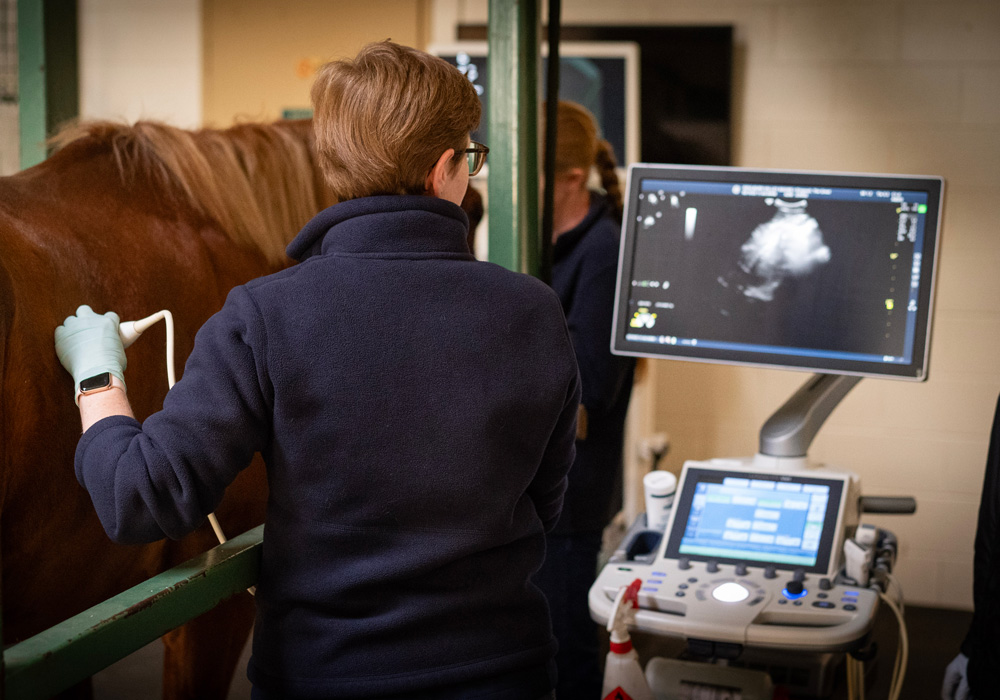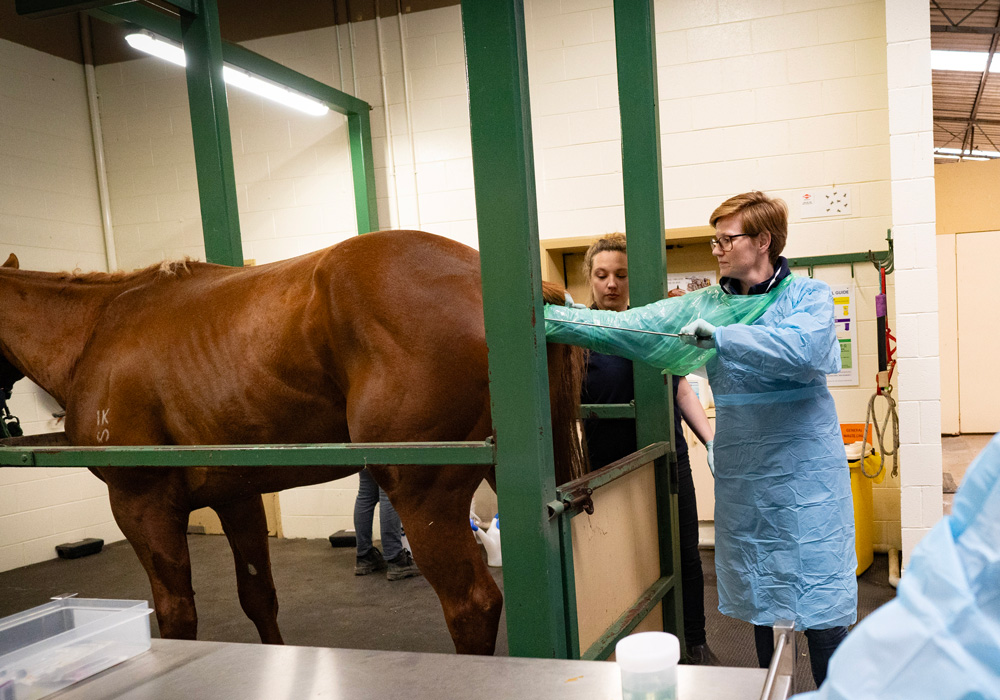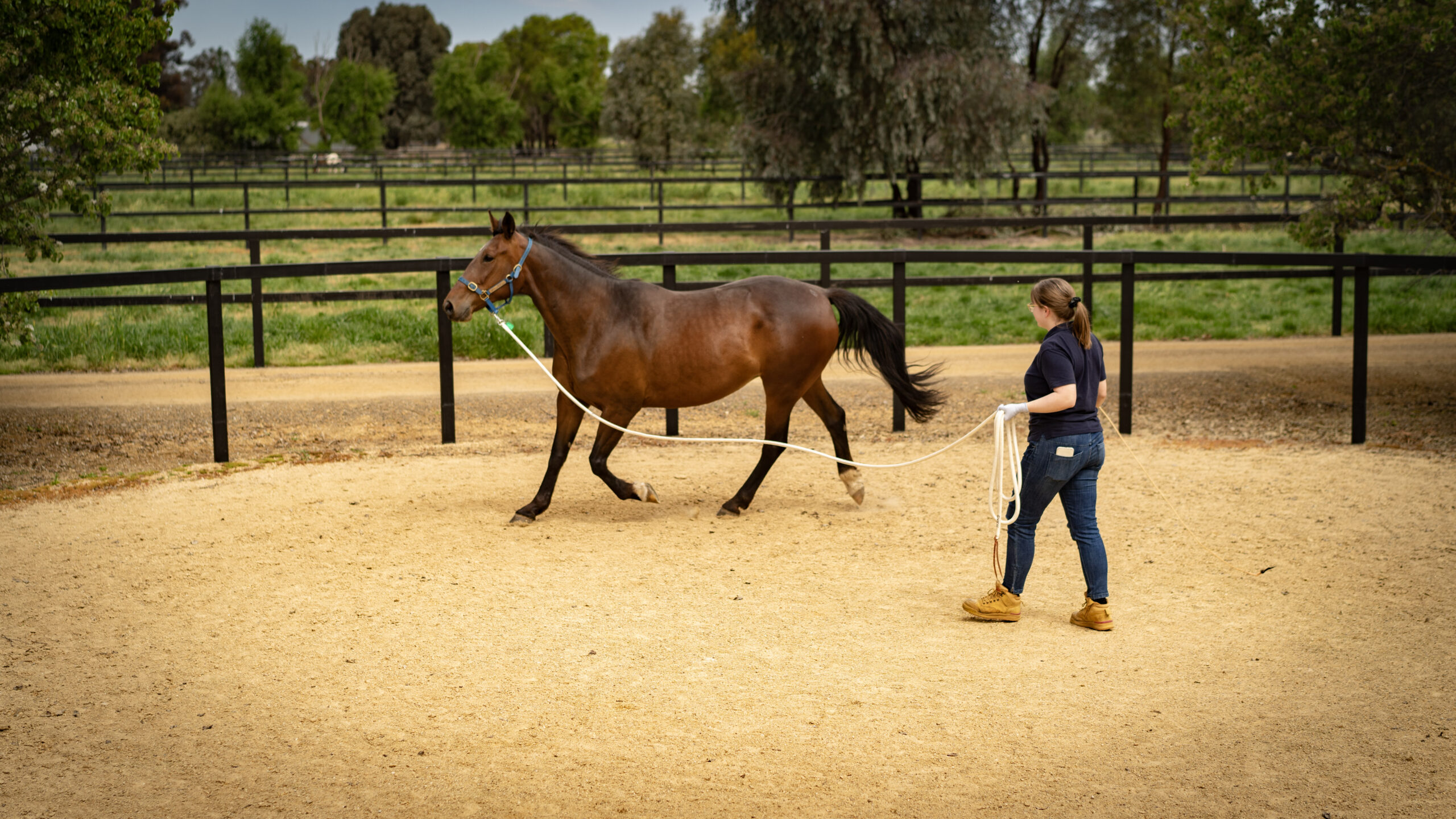Medicine
GVEH is a fully equipped hospital with modern diagnostic capabilities to assess and treat a wide range of first opinion and referral medical issues.
We have a range of state of the art diagnostic tools available including digital x-ray, ultrasound (including echocardiography), ECG, endoscopy, gastroscopy, scintigraphy, haematology, biochemistry, blood gas and electrolyte measurements and access to an in house laboratory to perform cytology, culture and sensitivity.

Endoscopy
Endoscopy allows the skilled Goulburn Valley Equine Hospital staff to provide non-surgical, minimally invasive diagnoses and treatment options to our patients.
Endoscopic imaging allows the veterinarian to examine an internal body part and evaluate the anatomy or pathology of the tissue. It is also helpful in collecting samples and biopsies and removing foreign bodies.
Goulburn Valley Equine Hospital uses endoscopy on a daily basis for:
Upper respiratory tract evaluation
This procedure is routinely performed prior to sales and is recommended during pre-purchase examination in order to assure the buyer that the horse’s exercise tolerance is not reduced by airway abnormalities that cause obstructions. Diagnoses can include:
- Tracheal collapse
- Subepiglottic or palatal mass (granuloma, neoplasm, cyst)
- Epiglottic hypoplasia, flaccidity, deformity
- Lymphoid hyperplasia
- Epiglottic entrapment
- Arytnoid chrondropathy
- EIPH (Exercised Induced Pulmonary Hemorrhage)
Dynamic endoscopic imaging, taken during exercise, is also available to diagnose subtle abnormalities such as:
- Dynamic laryngeal collapse (Recurrent laryngeal neuropathy (RLN)
- Intermittent dorsal displacement of the soft palate (IDDSP)
- Axial deviation of the Aryepiglottic folds
- Axial deviation of the vocal folds
- Pharyngeal wall collapse
- Palatal instability (rostral soft palate billowing)
- Epiglottic retroversion
- Intermittent epiglottic entrapment
- Axial deviation of the lateral margins of the epiglottis
- Ventro-axial deviation of the corniculate process
- Ventro-rostral displacement of the dorsal laryngeal mucosa
Nasal cavities
Endoscope can assess chronic nasal discharge or bleeding by evaluating the nasal passages for masses or hematoma formation along with drainage tracts from potential sinus infection. The guttural pouches are explored for sources of chronic infection, masses or fungal infection that can lead to persistent discharge or bleeding.
Stomach
Gastric (stomach) ulcers are a common problem in horses. Endoscopy diagnoses ulcers and determines the degree of ulceration and location within the stomach to help guide the treatment plan and duration.
Gastroscopy may also by performed if esophageal lesions, parasites, stomach impaction or perforation in the colicky horse is suspected.
Bladder
Endoscopy can be used to visualize the urethra, bladder and ureteral openings into the bladder. The procedure is commonly used to confirm bladder stones or tumors to determine the most appropriate therapeutic plan.
Urethra
Urethroscopy can be used to diagnose urethral blockage from small bladder stones. In the stallion, it can be used to diagnosis and treat abnormalities such as hemospermia or pyospermia, which are noted following breeding or collection.
Uterus
Hysteroscopy is used to visualize the endometrial surface of uterus when working up the problem broodmare. Diagnoses includes retained endometrial cups, adhesions, fungal plaques and foreign bodies.
Neonatal critical care
Our equine neonatal critical care unit allows specialised veterinary and nursing care of critically ill foals.
We see 75-100 sick foals annually and have a dedicated team of veterinary and nursing staff to provide round the clock care. Many foals that present to this unit require intensive management to maximise the chance of a good outcome.
We have 3 dedicated mare and foal critical care boxes. These purpose-built intensive care units are fully padded and lined, with underfloor heating, video survelliance and piped oxygen. They facilitate intensive medical treatment (intravenous fluids and blood pressure medication, nasal oxygen insufflation etc) but allow the mare to remain in physical contact with her foal so that bonding is maintained during the foal’s illness. For less intensive foal cases, we have a further 4 boxes which allow the foal to receive fluids and medications, while still being able to see and touch the mare.
Cardiology
Cardiac problems can present in multiple ways but most often we are required to investigate either an arrythmia (abnormal heart rhythm) or a heart murmur (abnormal heart sound) that has been identified during a clinical examination, as part of a poor performance investigation or during a prepurchase examination.
Our diagnostic capabilities for investigating heart disease include cardiac ultrasound (with M-Mode, Colour Doppler and Tissue Doppler) and electrocardiogrphay (ECG). We are able to perform resting, ambulatory (typically where your horse is kept in hospital overnight) or exercising ECG using radiotelemetry.
Neurology
Neurology is a branch of medicine that relates the brain, spinal cord and nervous system.
Routinely, a horse presenting as ‘neurological’, may show a range of clinical signs including; depression, head pressing, circling, recumbency or seizures. The more common types of problems we investigate are brain or spinal trauma, headshaking and ‘Wobbler’ disease.
Our experienced medicine team will assess the patient on presentation, and then select the most appropriate diagnostic test/s. GVEH hospital offer cerebrospinal fluid (CSF) collection and analysis, digital radiography and myelography to diagnose your horse’s problem and guide appropriate treatment.
Ophthalmology
GVEH provides a comprehensive equine ophthalmic service. We manage a range of eye issues ranging from simple corneal ulcers through to stromal abscess, tumour removal and ruptures. We also have an excellent working relationship with a registered specialist veterinary ophthalmologist who can provide additional insight and expertise for the more complicated cases. We have access to direct and indirect ophthalmoscopy, tonometry and ultrasound.
Digestive disorders/weight loss
Weight loss and digestive disorders are often multifactorial issues that require a thorough work up. This can include dental examination, rectal examination, blood sampling, gastroscopy, rectal biopsies, dynamic absorption tests, faecal analysis and ultrasonography of the abdomen. Commonly, our medical team diagnoses and manages gastric ulcers, chronic/recurrent colic and diarrhoea (colitis).
It’s important to recognise that sometimes weight loss is not a primary gastrointestinal problem.

Respiratory
Respiratory disease is a common cause of poor performance in equine athletes.
A combination of blood tests, endoscopy, ultrasonography and respiratory sampling techniques (BAL, tracheal wash) allow our team to determine the nature (inflammatory, infectious or physical) of the respiratory issue and guide management.
Similarly, foals may present with varying respiratory complaints ranging from pneumonia to intrathoracic haemorrhage. The diagnostic imaging, we have access to allow rapid identification of the cause of your foal’s respiratory issue.
Poor performance
Assessment of poor performance often requires a multidisciplinary approach from the medicine and surgery teams.
A routine work up a horse with poor performance involves lameness evaluation, resting or dynamic endoscopy, resting or exercising ECG, thoracic ultrasound, cytology and culture and blood work.

Dermatology
Skin disorders can be frustrating and an accurate diagnosis is integral to getting on top of the problem.
We offer a range of diagnostics including skin scrapings and biopsies.
These allow cytological and histopathological interpretation for accurate diagnosis and thus tailored treatment. Dermatological conditions can include; allergies, infectious diseases (eg ring worm), nutrition and endocrine disorders.
Our goal is to return your horse to their intended use as soon as it is safely possible.
Our holistic, team approach helps to achieve this goal.
